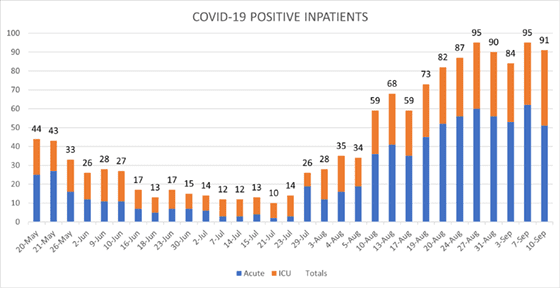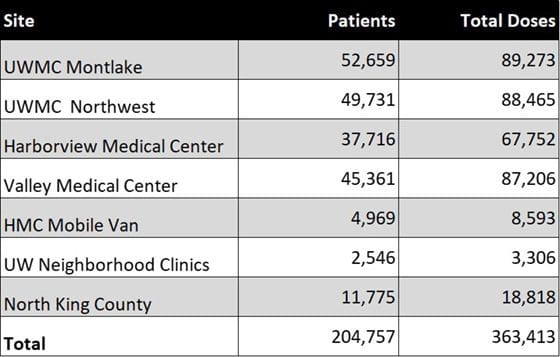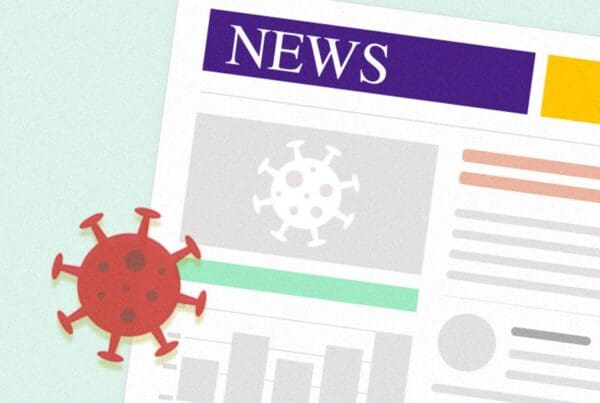Throughout the pandemic, we’ve continued to persevere as a community to provide the highest level of patient care and to ensure the safety of all who enter our hospitals, clinics and facilities. Amidst all the uncertainty, I continue to be proud of and inspired by such a resilient and dedicated group of colleagues.
Now, we find ourselves on the verge of yet another pivotal moment to come together as a community to battle this pandemic: the deadline to submit proof of COVID-19 vaccination. Per Governor Inslee’s proclamation, and in alignment with the University of Washington, all employees must be fully vaccinated by Monday, Oct. 18.
As a reminder, those who are not yet vaccinated or who have been denied a medical or religious exemption must receive a first dose of the Pfizer vaccine no later than Monday, Sept. 13, and a second dose no later than Monday, Oct. 4, to be fully vaccinated by Oct. 18. You are considered fully vaccinated two weeks after your last dose, whether that is the second dose for the Moderna and Pfizer vaccines or the single dose of the Johnson & Johnson vaccine.
It is now too late to get a first dose of the Moderna vaccine, which requires 28 days between doses. Anyone waiting until two weeks before the Oct. 18 deadline to get the Johnson & Johnson vaccine should plan on finding it outside of UW Medicine, as a statewide shortage has limited our access to more supply.
Today’s update includes:
- Local/National/Global Epidemiology
- Vaccination Summary
- What you need to know about vaccination compliance
- Non-urgent surgery postponement
- Home testing kits
UW Medicine COVID-19 Activity Summary

Local/National/Global Epidemiology
King County: Public Health – Seattle & King County is reporting 133,963 total confirmed cases and 1,812 deaths as of Friday, Sept. 10. The number of new positive tests is currently at 182.1/7 days/100,000 people (community transmission level = high).
Washington: The Department of Health reports 531,294 confirmed cases and 6,850 deaths as of Sept. 8. Of the 9,100,384 people who have been tested, 5.8% have been positive.
United States: The Centers for Disease Control and Prevention reports 167,638 new cases, 40,703,234 total COVID-19 cases and 654,409 deaths as of Sept. 10.
Global: The WHO COVID-19 Dashboard reports 223,022,538 confirmed COVID-19 cases and 4,602,882 deaths as of Sept. 10.
UW Medicine Vaccination Summary as of Sept. 9

*Site numbers show the number of employees, patients and community members who received vaccines at each site and the total number of first, second and third doses administered.
What you need to know about vaccination compliance
I can’t emphasize it enough: vaccination is the safest and most effective tool for ending this pandemic. If you still need to start the vaccination process, there are many local places where you can be vaccinated, including UW Medicine, doctors’ offices and pharmacies.
- UW Medicine personnel: If you were already vaccinated with UW Medicine through the employee process, no action is needed. If you were vaccinated through the UW Medicine patient process via Epic or at another healthcare location, including Seattle Children’s Hospital or the VA Hospital, you will need to submit proof of your vaccination using the link to our scheduling portal.
- UW School of Medicine employees: You should complete the vaccine attestation process in Workday.
- UW School of Medicine clinical employees: You should complete both the UW Medicine and Workday vaccination attestations.
Thank you for your support and cooperation in this effort to maintain a healthy and safe environment across UW Medicine for our colleagues, visitors and patients as well as for the broader community.
Non-urgent surgery postponement
With the latest surge in COVID-19 cases and hospitalizations regionally, we are experiencing staff and patient capacity challenges across the UW Medicine system. To help manage this impact, non-urgent surgeries are postponed until after Oct. 1. Physicians and operational teams continue to collaborate on reviewing every scheduled patient procedure through this date to determine which can be safely delayed. We will share updates on any further extension of surgery rescheduling that becomes necessary as we continue to monitor the COVID-19 situation and its effect on the capacity of our hospitals.
Home testing kits
I have received several questions about home testing kits. Following President Biden’s announcement yesterday, I am sure that we will hear more about this option. Until we learn more about the federal plan, the most important thing to know about home testing kits is that they are very useful when the test is positive and the person has COVID symptoms. It is very likely that this is a true positive result and the person has COVID.
The challenge is that the test, by itself, isn’t as good when the result is negative or when the person has no symptoms. These types of home tests can have both false negative results (return negative when the person is infected) and false positive results (return positive when the person doesn’t have COVID). But there may be some scenarios when they can be very helpful — for example, when they are used multiple days in a row or when the scenario is much lower risk. I’ll try to share more information on the weekly COVID messages as we learn more, and we’ll also talk about this on Town Hall.
I’d like to close this week with a recognition that Saturday marks 20 years since 9/11. This anniversary has made me reflect on the remarkable impact countless first responders, healthcare workers and public citizens had in the wake of that tragic event. For those of us who lived through it, we remember where we were, who we were with and how we felt in the moment. This pandemic is another one of those times, shaping how we live now and in the future. Like 9/11, it’s also a reminder of how a collective commitment to the health and safety of others leads to recovery. Today, your continued dedication to our patients and community already has us on the path to positive change. We will get through this together.
Sincerely,
John Lynch, MD, MPH
Medical Director, Infection Prevention & Control
Associate Medical Director, Harborview Medical Center
Division of Allergy & Infectious Diseases, UW School of Medicine
